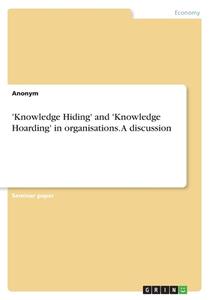
'Knowledge Hiding' and 'Knowledge Hoarding' in organisations. A discussion
- Editore:
GRIN Verlag
- EAN:
9783963553844
- ISBN:
3963553847
- Pagine:
- 20
- Formato:
- Paperback
- Lingua:
- Tedesco
Descrizione 'Knowledge Hiding' and 'Knowledge Hoarding' in organisations. A discussion
Seminar paper from the year 2018 in the subject Business economics - Corporate communication, grade: A, University of Malta (Ecnonomics, Management, Accountancy), course: Evidence-Based Management, language: English, abstract: The turn of the millennium saw the theory surrounding ¿the firm¿ shift from a traditional product-based view to a resource-based view, inspired by epistemology and suggesting a knowledge-based theory of the firm. Sveiby argued that by having people using their competences, value can be created in two ways, transferring and converting knowledge externally from, or internally to their organisation. Nowadays, this perspective has become widespread among the business community as well, however, despite the attempts by organisations to embrace a knowledge sharing culture, it has often resulted that employees are unwilling to share knowledge even when institutional practices are designed to facilitate such transfers. Cummings (2004) and Pulakos et al. (2003) agree that ¿knowledge sharing¿ refers to the provision of task information and know-how to help and collaborate with others in solving problems, developing ideas, or implementing policies and procedures. Research has demonstrated that knowledge sharing positively related to lower production costs, higher product development rates, better team performance and firm innovation capabilities; all being linked to growth in sales and revenue. Therefore, as Jackson et al. argue in their 2006 study, knowledge sharing is the fundamental means through which employees can contribute to knowledge application, innovation, and ultimately the competitive advantage of the organisation - a critical organisational resource, key to maintaining a competitive advantage in the market. One approach to maintaining a knowledge sharing culture is to invest in staffing and training systems that focus on selecting employees who have specific knowledge, skills, abilities, or competencies or helping employees acquire them. However, as Brown and Duguid (1991) warn, it is insufficient for an organisation to rely solely on this. In order to be competitive, emphasis needs to shift to the exploitation of the already-existing knowledge-based resources within the organisation. After all, the organisation does not and cannot ¿own¿ the knowledge of employees, and (therefore) to categorise such knowledge as an ¿asset¿ is fundamentally misleading.


